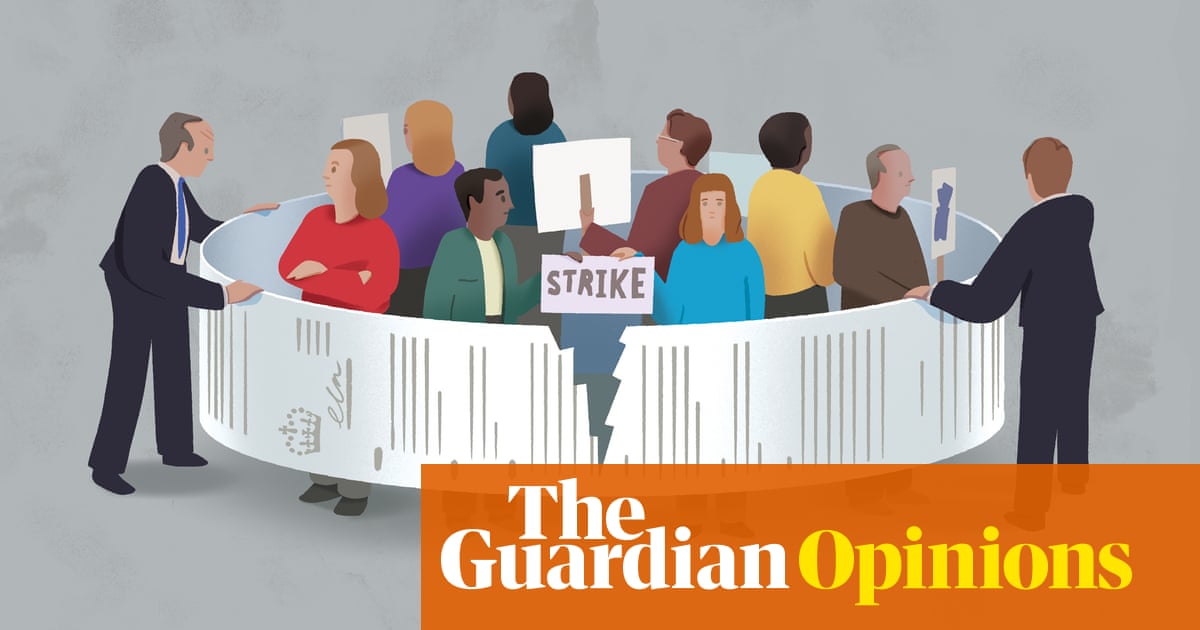
Nurse
Carmel O’Boyle has worked in the NHS for more than a quarter of a century, first as a healthcare assistant and then as a nurse at a walk-in centre in Liverpool.
“Winter pressures are always hard. But after working through the pandemic, we are just exhausted. Morale is on the floor. We are desperate for some help,” she said. “We are saying: enough is enough – we cannot go on like this. You can’t pour from an empty cup.
“We have a group going here where nurses are bobbing around Liverpool looking for good charity shops to buy toys for their kids,” said O’Boyle, who will strike for the first time, along with thousands of nurses across the UK, on Thursday. “That’s grim.”
Some nurses in the city are sharing homes during the day to keep bills down. “They take it in turns, so they only have to heat one house,” said O’Boyle. “Someone might look after all the kids on a Saturday so they only have to heat one house, and the others can put in extra shifts.”
Other nurses are using food banks in hospitals. Recently O’Boyle organised a whipround to buy food for a student nurse who brought in half a cucumber for lunch. The other half was all she and her flatmate had left for the rest of the week. “Trusts are now bringing in staff food banks because they’ve realised staff aren’t bringing in food to eat at lunchtime – or actually feed their families at home,” said O’Boyle. “It’s unbelievable that we’ve got staff on the poverty line in this day and age.”
Falling pay has driven many from nursing and made recruitment difficult. There are at least 47,000 nursing posts in England unfilled. “If we don’t pay people properly, we can’t recruit and retain,” said O’Boyle. “This impacts on patient care because there aren’t enough of us to look after people.”
Postal worker
Maria Lyons, the union rep running the picket outside Bristol mail centre, passionately believes the strike, which is set to run throughout much of this week, is about the very future of the Royal Mail.
“The least of what we are striking for is the pay. We are fighting for a postal service,” said Lyons, 53, who has been sorting letters and parcels at the centre for 21 years.
“Royal Mail wants to get rid of the universal service. They don’t want to honour this 500-year-old promise to deliver to every household, which is this most beautiful, egalitarian piece of British cultural heritage. It doesn’t matter where you come in the pecking order, everyone has this promised delivery to their address.”
The workers warming themselves by the brazier outside the largely empty staff car park fear that Royal Mail could eventually be turned into a gig-economy style parcel delivery operation. About 10,000 jobs are due to be cut by the company by August, with 240 jobs potentially going from the Bristol mail centre, according to the Communication Workers Union.
“They basically want to bring in agency staff and get rid of people on good terms and conditions, which have been fought for by the union,” said Lyons.
Royal Mail says it wants a more flexible workforce. The strikers fear they will have to work on demand, instead of agreed shift patterns. “They could call us in at any time. The business would own our lives,” claimed Lyons, who earns, like most postal workers, less than £25,000 a year. “I’ve got children. Lots of people have kids. It is not workable.”
The backlog of mail is growing in the centre, which serves Bristol and surrounding areas. There are currently around 400 cages of letters and packages waiting to be sorted. “There’s more out in the yard – there is almost as much outside as there is inside,” she said. “It’s unbelievable.”
Lyons argues it is Royal Mail, not striking postal workers, destroying Christmas: “We are doing everything we can to actually save a service which does deliver Christmas.”
Rail worker
Josh (not his real name), who is a caterer on mainline train services, earns less than £25,000 a year and has not had a rise for three years. He rents a room in a shared house in the north-east of England because he cannot afford his own place.
Josh will not sign up for a pay deal unless the train companies drop plans that, he said, would cut jobs, close ticket offices and bring in driver-only trains. “They want to minimise staffing levels on trains,” said Josh, who will be on strike for four days this week. “This came out in our latest pay offer: there were 13 changes we had to agree to to get 4%. One of them was driver-only operated trains. This would erase train managers’ roles, which would make travelling incredibly unsafe for passengers.”
Last week a passenger had a fit. Josh and his colleagues called the train manager, who arranged for him to be picked up by an ambulance. “That gentleman could have passed away,” Josh said.
Health emergencies are not the only problems, however. “At weekends, cases of sexual and physical assault are much higher. If staff aren’t there, trains are going to become lawless and dangerous,” said Josh.
Pay is still a big issue. Josh knows a few workmates who use food banks. He said: “One full-time worker in a food bank is a disgrace … to have food in the cupboard and a roof over your head should be no problem if you are working.”
He has no time for the argument that the government cannot afford to give in to workers’ demands. “It’s a complete lie. The money is there. They don’t want to give it because they want to line their own pockets and pay their friends. They can give £7.3bn to bankers,so they can pay us,” said Josh.
Most passengers are sympathetic, according to Josh. “If you are in first class, you do get a bit more negativity than standard class,” he said. “But overwhelmingly, the trains have been full of positive support.”












